Two years ago the Lighthouse to Lighthouse race boasted a complement of twenty-some surfskis – a respectable showing for an East Coast race, but nothing to work yourself into a lather over. Jump forward 25 months (we had a long winter) and the L2L is now the largest ski race in the country that’s not stuffed to bursting with Australian and South African filler. Eighty skis converged on Connecticut’s Shady Beach to compete in the East Coast Surfski Championship this year. Those in the 14 mile race would be racing on an out-and-back course that would take them by Peck Ledge Light (twice, if all went well) and around Greens Ledge Light. The 7 mile race would, by my math, be about a third of that distance.
The forecast in the days leading up to the race indicated heavy rains and the likelihood of thunderstorms, but indefatigable race director Gary Williams cashed in a handful of his karma points (don’t worry, he’s still flush) to push those storms off until evening. I don’t mean to quibble, but would it have killed him to splurge a little and knock a couple dozen degrees off the thermometer while he was at it? As it was, the temperatures would be in the upper 80s, with an exertion-adjusted heat index slightly above the melting point of lead.
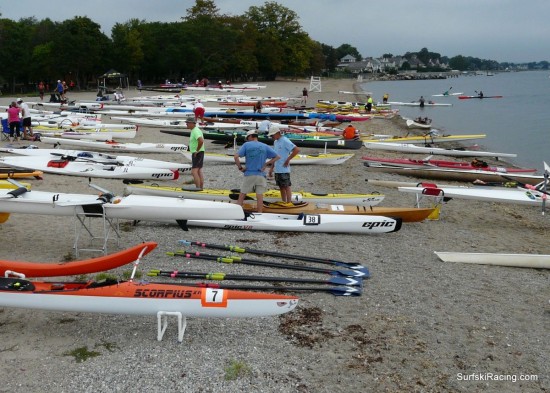
Not sure if the technical term is “flotilla” or “armada”, but the East Coast has never before seen such a congregation of skis (Photo courtesy of Betsy Echols).
The field was packed with talent. With Austin Kieffer, Reid Hyle, and Borys Markin attending, we’d have the 1st, 6th, and 8th place American finishers from the recent US Championships in San Francisco. And, of course, the 3rd place overall woman finisher in Beata Cseke. All the local standouts were racing, as well as some regional stars from as far away as South Carolina. Given my recent paddling funk, breaking the top ten would require 3 to 5 separate loaves-and-fishes caliber miracles. Plus maybe a little rudder line sabotage, just to be safe.
Unfortunately, New England mainstays (and frequent contributors of priceless raw material for these reports) Kirk Olsen and Bill Kuklinski were race day scratches. While making their way down the Mass Turnpike, their ski rack was ripped from Kirk’s car and deposited on the side of the highway. Nobody was hurt, but the skis suffered a few race day scratches of their own. Based on his various misadventures during the 2013 season, it looked like Jan Lupinski might usurp Kirk’s role as the guy you’d least want to be standing next to in a thunderstorm. However, between somehow wedging his paddle under a competitor’s rudder during the Double Beaver and this latest ski-lift maneuver, Kirk has stepped up his game.
During the course of the day I met a dozen or so new paddlers, all of whom were named either Mike or Mark. I suggest that in the future, race officials enforce a more stringent Mike/Mark cap to level the playing field.
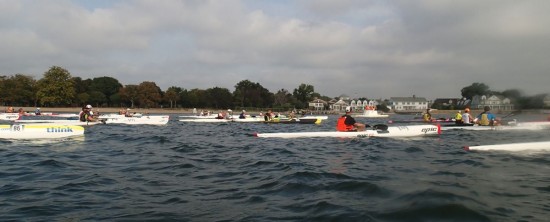
Maybe I should have concentrated a little more on the race start and less on taking crappy pictures.
Let’s skip ahead to the part of the report where I’ve gotten off to a terrible start but, with scrappy determination and a can-do attitude, I’m clawing my way towards the front. Actually, I’ve gotten a little tired of that clichéd narrative arc. Let’s instead say that I’ve gotten off to a terrible start but, with a growing sense of panic and frustration, I’m clawing to hang onto whatever draft wafts my way. I passed a few boats right after the the start, but after a few minutes I was making no further progress through the ranks. Fortunately, I managed to pull myself together long enough to bridge a small gap to Chris Laughlin. It wasn’t a flashy promotion, but I was working my way up the ladder.
Chris was holding fast on Rowan Sampson’s wash. I settled in behind Chris to also take advantage of the latter’s legendary strength. I had the foreboding sense that someone was on my tail as well, but since I make a point in life of not confronting my fears, I kept my eyes forward. Matt Drayer has a distinctive stroke that allows you to pick him out of a crowd from a distance – and not just when he’s on land. I had spotted him some minutes earlier up ahead and now was pleased to find that we were closing on him. Even though I wasn’t actually the one doing the work to reel in Matt, a small flicker of optimism was ignited. Maybe I could turn this race around…
Or maybe things would get worse. Yeah, that one. Chris took over pulling from Rowan and we did pass Matt, but I could no longer hold on to the train. That lonely spark of optimism was gently snuffed out. Then – just to be sure there were no lingering embers – Chris Chappell, Peter Kahn, and Matt ground their heels on the ashes as they passed in succession. It was a kindness. I was now inoculated against further episodes of foolish hope. I paddled on toward the turn-around at Greens Ledge Light.
Immediately after turning and starting the downwind run back home, I realized that I had made a terrible mistake. By showing up, I mean. I had been paddling poorly up until this point – there’s no way around that. I was drained and discouraged. With the loss of the marginally refreshing headwind, however, whatever small reserve of competitive juice I had left boiled off in the blistering conflagration. I just hoped that the authorities would have time to clear out the islanders before my inevitable nuclear combustion. When Tim Dwyer and Wesley passed me a few minutes later, I felt not the least twinge of disappointment – only envy that they’d be out of this frying pan sooner than I would.
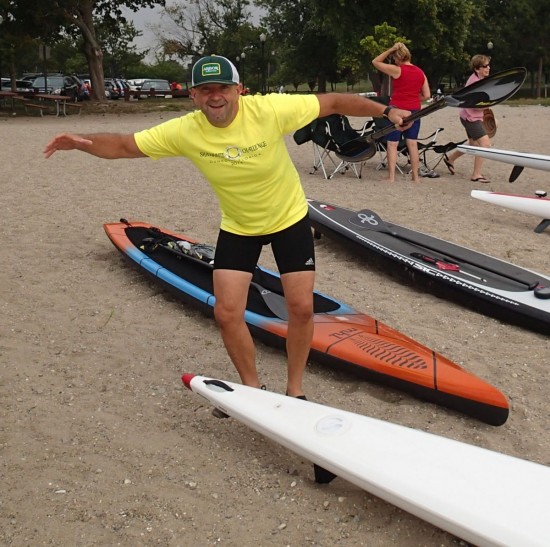
It’s been kind of a downer report so far, so I figured I’d ask Jan to provide a little comic relief.
They always tell you not to try out any new equipment or procedures on race day, but I figured I could exempt a hat from that dictum. I’ve worn hundreds and – excluding a sombrero incident I’d rather not get into here – have never had problems that couldn’t be resolved with a 500 peso note and a midnight escape by burro. Good ol’ Stanley. I generally tether my hat to my PFD so that if I somehow slip out of the jacket after a spill, I’ll dangle comfortably just a couple feet under the surface for easier retrieval. I was using a new hat with a slightly different tether for the L2L. Not sure why, other than the thrill of living on the edge.
When I caught the first whiff of burning human flesh about 15 minutes into the return trip, I figured it’d be wise to quench the fires before the aroma attracted cannibals from nearby Long Island. I whisked off my hat to scoop water over my head, only to find that I was a latter-day Tantalus. For a few seconds I stared stupidly at the hat, held stubbornly motionless a foot over the surface by its tether. Failing to grasp the simple mechanics of the situation, I lifted the hat and tried again. Still no dice. Finally understanding what was going on, I tried several contortions to lower my shoulder (and the tether anchor) closer to the water – excellent balance practice, by the way. Giving up on this unsuccessful strategy, I fumbled to undo the velcro closure on the back of the hat and detached the leash. Unbeknownst (man, that really doesn’t look like it should be a word) to me, in my overheated haste I had inadvertently ripped off the strap containing the velcro loops and dropped it unseen between my legs. I found myself confounded yet again as I tried to reset the velcro adjustment – the hooks refused to attach to any part of the hat, no matter how many increasingly vehement expletives I applied.
I wasn’t sure I wanted to live in a world where velcro could just mysteriously stop working (what’s next, post-it notes dropping off willy-nilly?), but I had more pressing problems. Without the strap to hold it in its proper shape, my cap was now just a limp piece of nylon. As such, it scooped water about as well as a teflon coated spatula. What little water that actually made it to my head did nothing to quench the inferno – it evaporated in a cloud of steam before it could even drip past my ears. Lacking built-in pate protection, I spent the remainder of the race either balancing the formless cloth on my head or using it to flip token splashes of water on myself.
You may think I’ve wasted an inordinate amount of time writing about a stupid cap. That’s true, but there’s a method to my madhatterness. While you’ve been occupied trudging through the last few paragraphs, I managed to finish the rest of my god-awful downwind leg without having to relive the experience in writing. You didn’t miss much. I got passed by yet another Mark and Mike (Mckenzie and Alexeev – both of whom seemed way too chipper for the searing apocalypse we found ourselves in). I caught and passed Wesley, who was cramping so badly from dehydration that he resembled one of those gnarled Inca mummies that turn up every so often in the Andes. Once I managed to ooze around Peck Ledge Lighthouse, a cross-wind provided enough of a respite from the heat that I was able to regain solid form for the finish.
I had managed to break the coveted 2:07 threshold by a single second – good enough for 18th place. Some 25 minutes earlier, Austin had set the new surfski course record, with Borys and Reid taking the other podium spots. Jan (who ages like a fine cheese over the course of a season), Craig Impens, Andrius Zinkevichus, Flavio Costa, Andrew McMarlin, Beata, and Eric Costanzo filled out the remaining top ten singles’ spots. In the women’s race, Beata was joined in the money by Pam Boteler and Mary Beth. Eric McNett and Jim Mallory made short work of the double’s race.
At last year’s race, Mary Beth had badly Markin’ed the course, paddling past the returning cut-in at Goose Island and instead rounding Cockenoe Island (and then some – you can never be too sure). That added about 2 miles to her day, granted, but fails to explain how she managed to come in 38 minutes quicker this year. She has been subject to bouts of uncontrollable rage recently, but there’s probably no connection there. For her effort, she was rewarded with an oversized novelty check which she has since lorded over me mercilessly, and with an alarming disregard for logic. As in… Me: “Don’t you think the TV is a little loud?” Her: “When you’ve won a substantial cash prize, you can choose the damn volume. Now make me some waffles.” I might just have to ask Kirk to strap that check to the top of his car.
With solid sponsors (Stellar and WomenCAN International), impeccable organization, the best post-race spread in the business, and more lighthouses than one person could ever hope to count, the L2L is already the premier East Coast surfski race. However, Wesley has set a goal of making it the biggest surfski race in North America – a lower-key alternative to the US Championships out west. Knowing the Echols’ drive, even if that means duct-taping unsuspecting beach-goers onto boats and pushing them out to sea, I suspect he’ll see to it that we have 125 skis in a year or two. I was going to helpfully suggest a tongue-in-cheek slogan to draw paddlers from the Championships – “You’ve seen the best, now paddle with the rest!” – but with competitors like Austin, Borys, Reid, and Beata showing up, I’m afraid that tagline doesn’t really hold water. I’m looking to forward to finding out who turns up next year, and in what quantity.
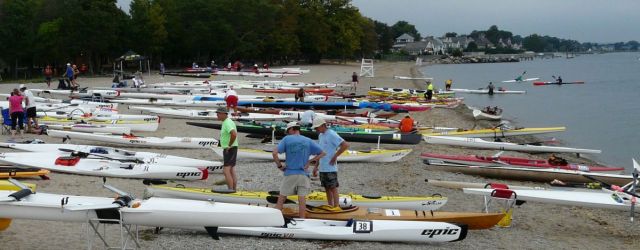
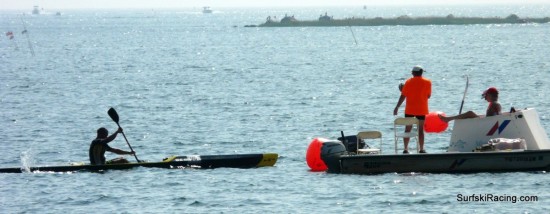
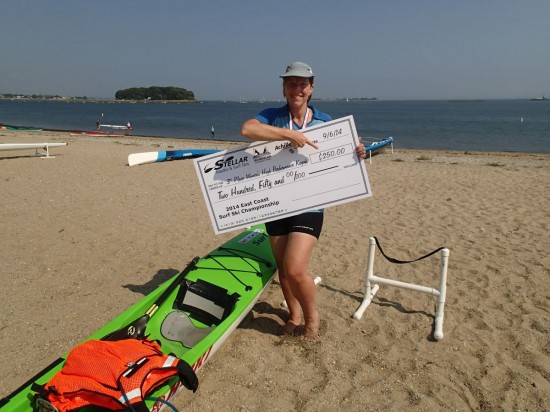
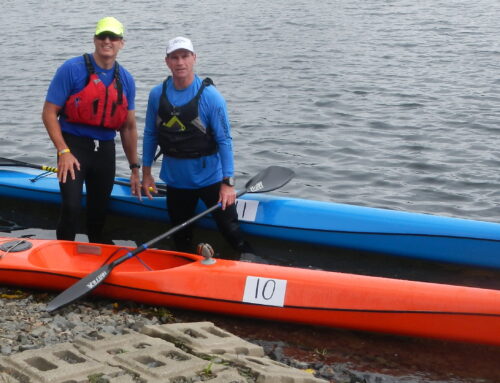
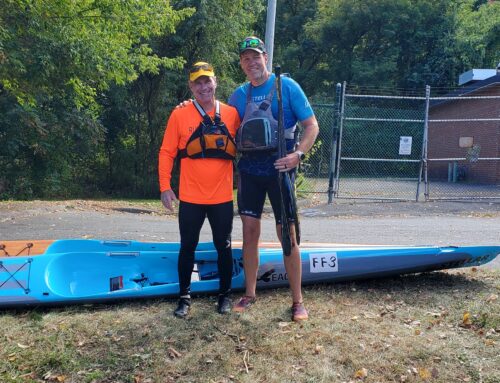
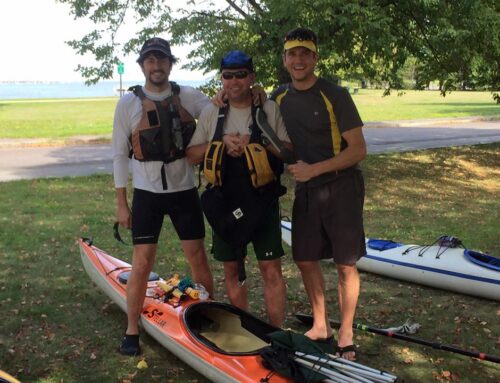
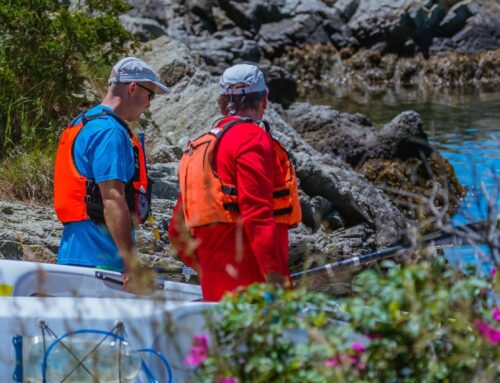
Leave A Comment
You must be logged in to post a comment.